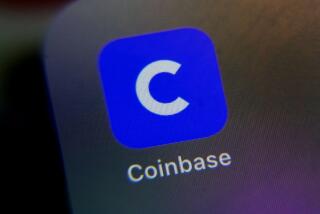SEC Proposes Rules to Eliminate IPO Abuses
- Share via
U.S. securities regulators Wednesday proposed rules aimed at stopping Wall Street underwriters from artificially spurring demand for stock offerings.
The Securities and Exchange Commission voted 5-0 to seek public comment on the rules, which would bar underwriters from inducing customers to buy shares sold in initial public offerings. Underwriters wouldn’t be allowed to allot hot IPO shares in exchange for investor promises to buy more shares later at higher prices or in less-attractive offerings.
The proposals take aim at abuses that surfaced in the Internet stock boom that ended in mid-2000 and were criticized in SEC settlements with J.P. Morgan Chase & Co. and Credit Suisse Group’s Credit Suisse First Boston.
By explicitly barring these practices, the proposals would make it easier for the SEC to win lawsuits challenging this misconduct.
“Instead of having a broad sword, the SEC would have a sharper sword to go after these abuses, and the sharper sword may save the enforcement staff some time,” former SEC Commissioner Edward Fleischman said.
SEC Chairman William H. Donaldson said the new rules were designed to treat all investors equally. Share prices “should be free from manipulative influence or misconduct on the part of those who brought the offering to market and who stand to profit most,” he said before the commission vote.
J.P. Morgan, the second-biggest U.S. bank, agreed last year to pay $25 million to settle claims over its allotment of IPO shares. The SEC said the bank gave shares in exchange for customer commitments to buy more once the shares started trading, a practice known as laddering that can inflate demand.
Credit Suisse agreed in 2002 to pay $100 million to settle charges that it allotted sought-after IPO shares in exchange for investor kickbacks in the form of higher commissions. Both banks neither admitted nor denied wrongdoing.
Jay Ritter, a finance professor at the University of Florida in Gainesville, called the proposals “better late than never.”
“The SEC historically has not been very aggressive on this issue, and as a result it opened the door for extensive abuses five years ago,” Ritter said.
Also Wednesday, a federal judge ruled that Morgan Stanley, Credit Suisse First Boston and dozens of other investment banks had to face at least six class-action suits over claims that they rigged IPOs in the 1990s.
U.S. District Judge Shira Scheindlin in New York certified as class actions six of 310 cases arising from allegations that the IPO market was manipulated by the banks and the Internet start-ups they took public during the technology stock boom. Scheindlin also said it was likely she would certify the 304 remaining suits as group cases as well.
The ruling means investors may sue Internet start-ups such as Engage Inc. and Firepond Inc. as a group, increasing the shareholders’ leverage in settlement talks. Stanley Bernstein, one of the plaintiffs’ lawyers, said millions of investors may be covered.
“This is a wonderful victory for investors,” Bernstein said. “There is no one bank that stands out for committing more fraud than the others. This was industrywide.”
The banks declined to comment.
Melvyn Weiss, another lawyer for the investors, said he expected the banks to appeal the ruling. “They will try anything to block us,” he said. “I don’t want to hold out any hope that this will be resolved within the year.”
Last year, the 310 Internet companies, including Razorfish Inc. and Red Hat Inc., agreed to pay as much as $1 billion to settle identical claims that they rigged IPOs. The investors said the start-ups conspired with the banks to manipulate the market.
Investment banks raised about $130 billion for the companies they took public during the IPO frenzy. The banks made billions in fees. Investors who received IPO shares profited from selling stock as prices soared. Many of those stocks later plummeted and the companies filed for bankruptcy protection.
More to Read
Inside the business of entertainment
The Wide Shot brings you news, analysis and insights on everything from streaming wars to production — and what it all means for the future.
You may occasionally receive promotional content from the Los Angeles Times.










